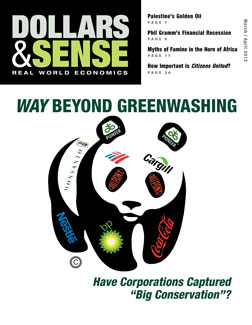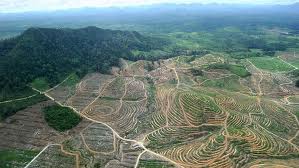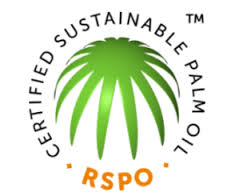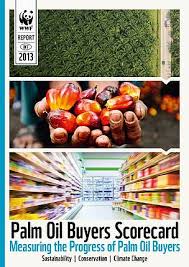 WWF has founded a number of controversial certification schemes including:
WWF has founded a number of controversial certification schemes including:
The problems with the FSC and MSC are discussed elsewhere on this site.
WWF's investment arm is raking in billions of dollars (I have been told this could be in the range of $60 billion for just one standards-based scheme in the Amazon) from the various schemes it oversees and then takes a cut from.
The rapidly expanding market for soy beans is having drastic environmental consequences:
The area that is therefore taking the brunt of this 'soya boom' is Latin America, already a major soya exporter, where the area given over to soya cultivation may swallow up another 22 million hectares of savannah and tropical forest by 2020. It will also drive rural communities off the land and destroy small scale and subsistence farming.
 The Roundtable on Responsible Soy (RTRS) was founded in 2004 to promote "responsible production, processing and trading of soy on a global level", but not a reduction in its growth, causing the RTRS to be criticised for legitimising soy expansion and the accompanying deforestation.
The Roundtable on Responsible Soy (RTRS) was founded in 2004 to promote "responsible production, processing and trading of soy on a global level", but not a reduction in its growth, causing the RTRS to be criticised for legitimising soy expansion and the accompanying deforestation.
Founded with the help of WWF it now has more than 150 members including growers, manufacturers, retailers and others.
Members range from Monsanto, Syngenta, Cargill, Bunge to Unilever, Shell, BP, Conservation International, The Nature Conservancy, WWF and producers such as Gruppo André Maggi - the world's largest soybean producer based in Brazil.
The criteria for responsible soy production has been agreed to by members by consensus, so that even adherence to the law is only put in terms of 'recognition' and 'respect' for legal limits. Moreover, it allows clearing of forests if the producer deems the forest not to be high conservation value and not belonging to local people.
The RTRS also allows the use of pesticides and herbicides, such as Glyphosate which has been shown to cause reproductive problems, on the soy bean crops.
The giant Maggi farms in Brazil are RTRS certified: "In no other Brazilian state was as much virgin forest cut down as in Maggi's soybean republic. The areas now occupied by his RTRS model farms were cleared only a few years ago." The soy on the Maggi farms is genetically modified. This did stop WWF from hailing the first shipment of RTRS soy beans to Rotterdam, which was supposed to be from the Maggi farms, as a success of the roundtable and claiming that the beans were not genetically modified.
The criteria for 'responsible' production, in fact, include genetically modified (GM) soy which make up 60 percent of global production.
In the case of GM soy monocultures, they tend to create over-reliance on one herbicide (usually Monsanto's RoundUp), resulting in the development of herbicide-resistant weeds; leading to the use of greater volumes of chemicals to control them. They also make famers dependent on patented product ranges and have been linked with health problems in people exposed to the aerial spraying of herbicides. They question the authentication of this kind of farming under the label 'sustainable'.
 Palm oil is used in many products including biodiesel, shampoo and skin lotion and foods such as margarine, buscuits, bread and ice cream. 86% of it is sourced in Malaysia and Indonesia where "the heavy use of pesticides on the monocultures is polluting rivers and ground water. Slash-and-burn agriculture has turned Indonesia into one of the world's largest emitters of CO2." Even WWF admits:
Palm oil is used in many products including biodiesel, shampoo and skin lotion and foods such as margarine, buscuits, bread and ice cream. 86% of it is sourced in Malaysia and Indonesia where "the heavy use of pesticides on the monocultures is polluting rivers and ground water. Slash-and-burn agriculture has turned Indonesia into one of the world's largest emitters of CO2." Even WWF admits:
Clearing land for palm oil plantations has led to widespread loss of rainforests in Indonesia, Malaysia and beyond. This has destroyed habitat for endangered species like rhinos, elephants, tigers and orang-utans, and robbed indigenous people of their land and livelihoods. It also fuels climate change.
Although some argue that production of palm oil should stop as it can be replaced by other oils and products, the certification of palm oil by the Roundtable on Sustainable Palm Oil (RSPO) enables production to be expanded whilst allowing consumers a clear conscience. It is that expansion that is at the heart of the problem.
The RSPO was founded by WWF in 2004 in conjunction with palm oil growers and producers such as Unilever, one of the largest palm oil processors. It certifies palm oil growers if they:
The reason these criteria is so vague and unrestricting is that RSPO members have a say in the development of these criteria and it seems that little more is required than membership fees for companies to get their green credentials:
By joining the RSPO, organizations publicly communicate their commitment to sustainable palm oil production and use as well as to raise their reputation as a proactive, solution-oriented and socially responsible organization.
According to WWF's Global Forest and Trade Manager Lydia Gaskell, "To take a company off certification for failing to meet standards and criteria is at the very least, impractical".
Greenpeace UK points out that since the RSPO was established:
forest destruction has continued. Many RSPO members are taking no steps to avoid the worst practices associated with the industry, such as large-scale forest clearance and taking land from local people without their consent. On top of this, the RSPO actually risks creating the illusion of sustainable palm oil, justifying the expansion of the palm oil industry.
Our investigations - detailed in our report Cooking The Climate - found evidence that RSPO members are still relying on palm oil suppliers who destroy rainforests and convert peatlands for their plantations.
 WWF publishes an annual Palm Oil Buyers Scorecard which assesses 130 companies on whether they use RSPO-certified sustainable palm oil (CSPO):
WWF publishes an annual Palm Oil Buyers Scorecard which assesses 130 companies on whether they use RSPO-certified sustainable palm oil (CSPO):
"We look at company performance in four key areas:
– Being an active member of the RSPO;
– Making a public commitment to CSPO;
– Disclosing how much palm oil they use;
– Showing how much of the palm oil they use is CSPO or is supporting sustainable production."